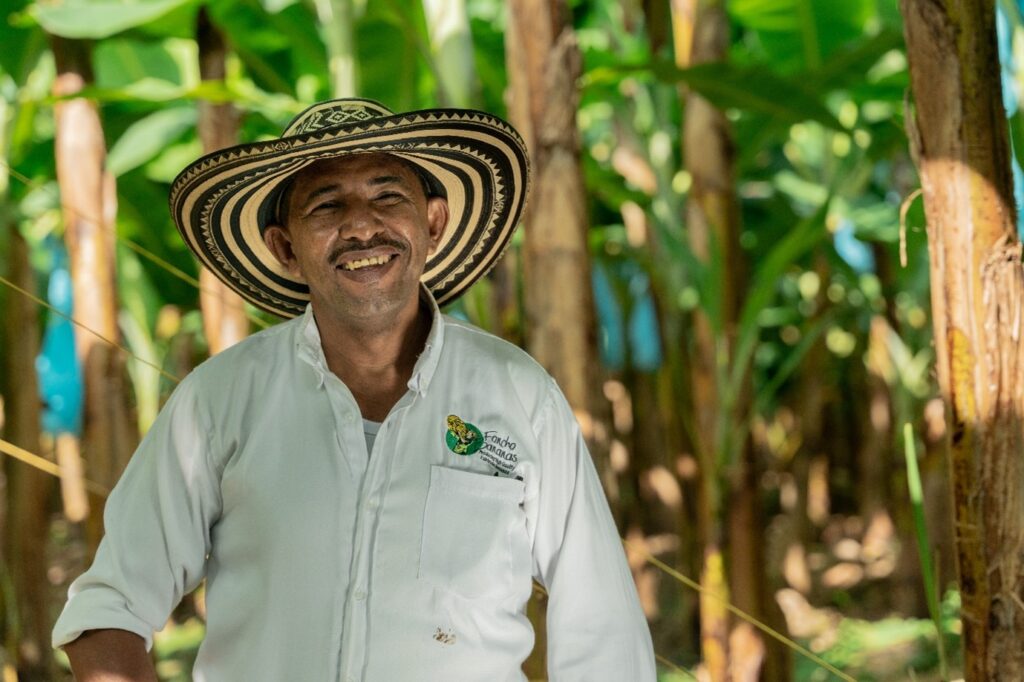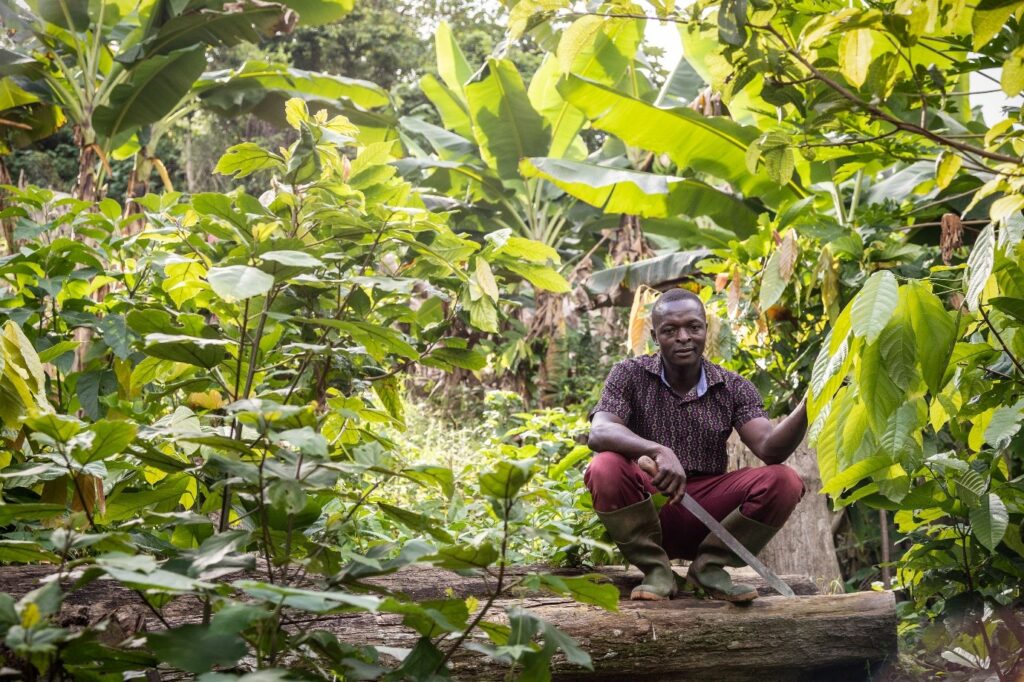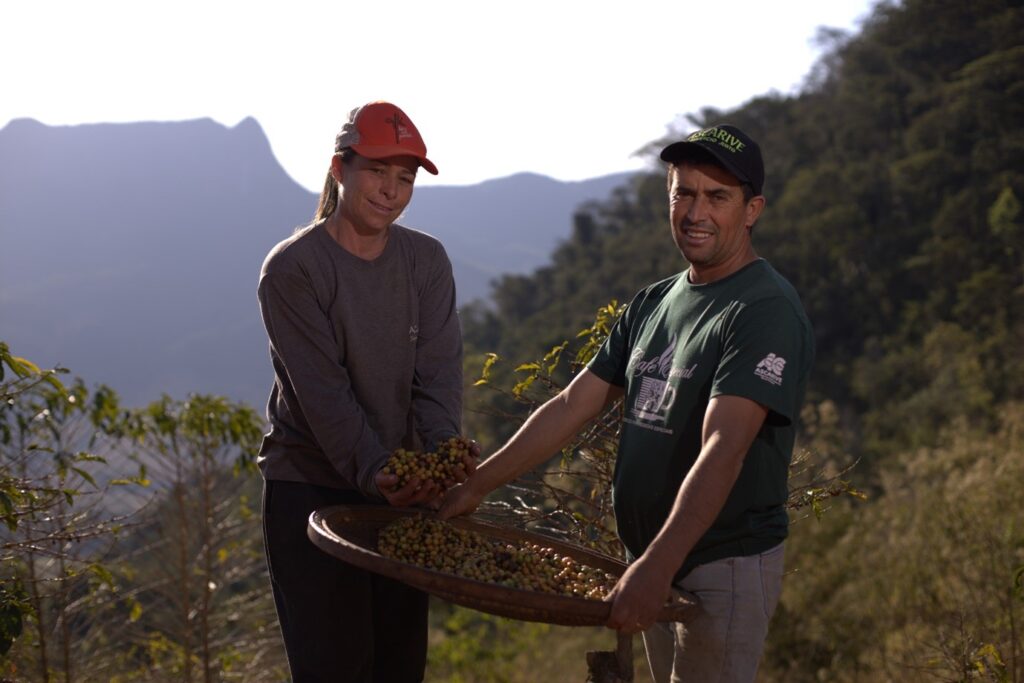Farmers play an important role in our everyday lives, and yet their everyday lives are often forgotten.
In a world that is increasingly seeing the impacts of climate change, farming communities are often the worst affected despite having done least to cause the climate crisis.
These communities, which are already facing hardships due to unfavourable trade practices and unfair prices, are now also having to deal with increasingly extreme weather and more frequent plant diseases.
Many farmers are already changing the way they farm. Meet Foncho, Sadick, Liliane and Mauro, who with the support of Fairtrade, are doing what they can, so that they can keep growing the foods we love to eat here in the UK.

Albeiro Alfonso Cantillo – a farmer born into bananas
This farm means everything to us, especially for me and my family.
Albeiro Alfonso Cantillo
Albeiro Alfonso Cantillo, or Foncho as his friends call him, is a banana farmer in the Magdalena region in Colombia. He was born into bananas, as his farm has been passed down from generation to generation.
However, climate change is increasingly putting the livelihoods of farmer’s like Foncho at risk.
Unpredictable weather patterns, rising temperatures, hurricanes, droughts and floods are some of the effects of climate change. For countries in Central America and the Caribbean, this means less rainfall and more extreme temperatures.
The climate has definitely changed – today we can’t predict the climate as we used to before, like our elders did.
Albeiro Alfonso Cantillo
Not only are changes in weather having an impact on what is one of the UK’s favourite fruits, but because of these changes pests and diseases are also spreading their way through Latin America, Asia and Africa.
Bananas are extremely susceptible to Tropical Race 4 Fungus (TR4) and black rust. TR4 is a soil-borne fungus which gets into the plant through the roots and affects the way it takes in water, whereas black rust is caused by thrips, a type of insect.
However, according to Foncho, with Fairtrade, banana farmers now have “the tools to fight the effects of climate change”.
Being part of a Fairtrade-run initiative called Productivity Improvement Programme (PIP) has provided farmers with ways to manage plant diseases, reduce carbon and water footprint and improve fruit by using bio-fertilisers. Through this, they have saved money, used less water and improved the health of soil.
“Today my production is higher, the black rust control is better, I have a better stability inside my plantation”.
Foncho says that he is grateful for the stability of the Fairtrade Minimum Price which provides a safety net for growers.
Those two dollars we get above the cost of each box makes a difference for us, so we could be able to sustain ourselves as a family.
Albeiro Alfonso Cantillo

Sadick Abanga – the farmer planting trees for the future
I didn’t know I was punishing the land, now because of this project I’ve seen the benefits, there are more nutrients in the soil.
Sadick Abanga
Sadick farms nine acres of land in Ghana for cocoa. He’s been doing this for 18 years and it’s getting increasingly difficult due to the climate crisis.
Part of his farm lies high on a rocky, steep hillside, unfriendly terrain for cocoa plants. When he first bought the land, he said: “It was so bare rays of sunshine hit the land.”
As cocoa is sensitive to environmental changes, growing the beans is becoming increasingly difficult and uncertain due to rising temperatures, volatile rain patterns and the increased susceptibility of trees to drought.
The rainfall pattern, it’s not like it was before. When there is too much sun most of the cocoa dies.
Sadick Abanga
Now, since being part of the dynamic agroforestry (DAF) project, his farm is protected by the shade of a variety of trees.
This is a technique he discovered after joining the project, which offers farmers from Sadick’s co-operative training in methods to adapt to climate change by improving soil, planting for shade, and attracting biodiversity.
Dynamic agroforestry is a combination of agricultural cultivation and agroforestry where farmers create natural forest-like systems that support a large variety of different food crops.
By mimicking natural forests, these methods bring many benefits such as soil fertility enhancement, reduction in pest and disease pressure, erosion control plus extra income.
In the past we used to cut small trees, burn the bush to clear everything from the land to get rid of weeds… I didn’t know I was punishing the land, now because of this project I’ve seen the benefits, there are more nutrients in the soil.
Sadick Abanga
Sadick explains that now the farmers do not apply weedicide or any chemicals, because the legumes they plant add extra nutrients as well as income whilst they wait for the cocoa to grow.
The climate and cost of living crises are severe threats to the livelihoods and communities of farmers like Sadick, but working as part of a team, with Fairtrade behind them, means they are able to access the support they need to keep on farming the cocoa we love.
In Sadick’s words, ‘we have officers to give us training and education, bonuses from the Premium, and they don’t discriminate, whether you are male or female you have a voice.’

Liliane and Mauro di Silva – a coffee-growing, future-focused team
We are not in charge of the climate, but we can collaborate a lot with it.
Liliane di Silva
Husband and wife duo, Liliane and Mauro farm coffee in Minas Gerais located in Brazil’s Serra da Mantiqueira, the land of specialty coffee.
It was what Liliane’s father did, and she wants her own teenage girls to be able to carry on the proud family tradition of producing top quality coffee, “our goal is for them to leave and study, but to return to the land where they were born and carry it forward”, Liliane says.
With the costs of farming going up, coffee prices increasingly volatile and the effects of the climate crisis deepening, it’s hard to imagine that staying on the farm is an attractive career option for their children.
Their fellow coffee farmers in other parts of Brazil have suffered very badly from unusually heavy frosts, and the couple have noticed that the weather is getting increasingly unpredictable.
We live and own property in an area very favourable for coffee, but, even so, we suffer a lot with the climate’s setbacks. To produce a special coffee, we need the climate.
Liliane di Silva
She and her colleagues in Ascarive, the Fairtrade co-operative they belong to, are trying out different methods for protecting their harvests.
There’s a risk these measures won’t work but they have to try. The support they get from Fairtrade means they have access to expertise and information about what’s been successful for coffee farmers elsewhere, as well as financial support.
So, what have they done to keep supplies of coffee flowing into our cups in the UK? As Liliane puts it, “we are not in charge of the climate, but we can collaborate a lot with it”.
Her neighbour and Fairtrade farmer Maria Paul agrees. “We develop green manure projects, beekeeping projects… biodiversity development and protection. And this has brought several benefits to our region. Why? Because when the producers take better care of their crops and of nature itself, it will be more resistant to overcome these environmental disasters.”
For Luiz, another co-operative member, it’s changed how he thinks about farming: “today I think about taking care of my piece of land there, of the hectares of coffee there. Not just the coffee tree, but the soil. This opened my mind a lot.”
Mauro believes it’s not just about techniques but also about facing the challenges together. He says that “coffee production is what I know how to do, I enjoy doing, I love working with coffee, and I see a lot of future. There have always been setbacks. Inputs, climate change, everything. But together we will learn to overcome these difficulties.”
The more sustainable I am, the more my children will have a future.
Liliane di Silva
Without immediate climate action, many of the UK’s favourite foods will be much more difficult to grow within the next two decades. However, this will need a joint effort from governments, businesses, consumers as well as producers themselves. This includes providing farmers with a seat at the table in decision-making rooms, businesses transitioning to fairer purchasing practices and everyone making more sustainable choices in their shopping.
